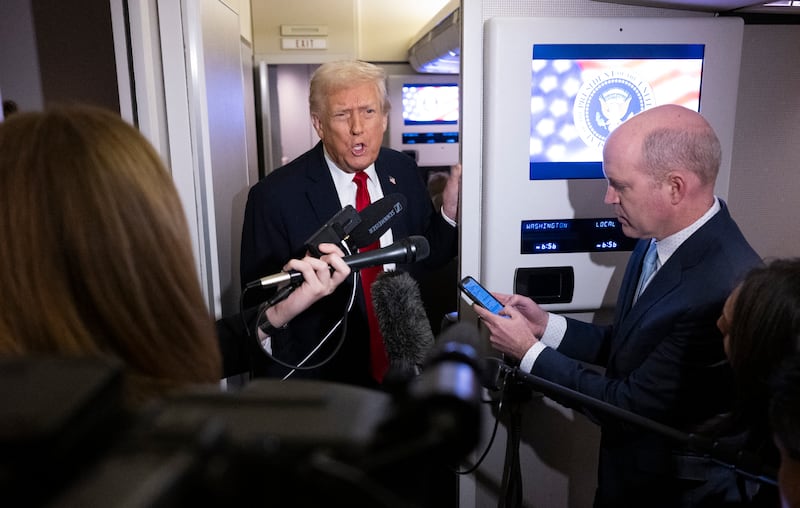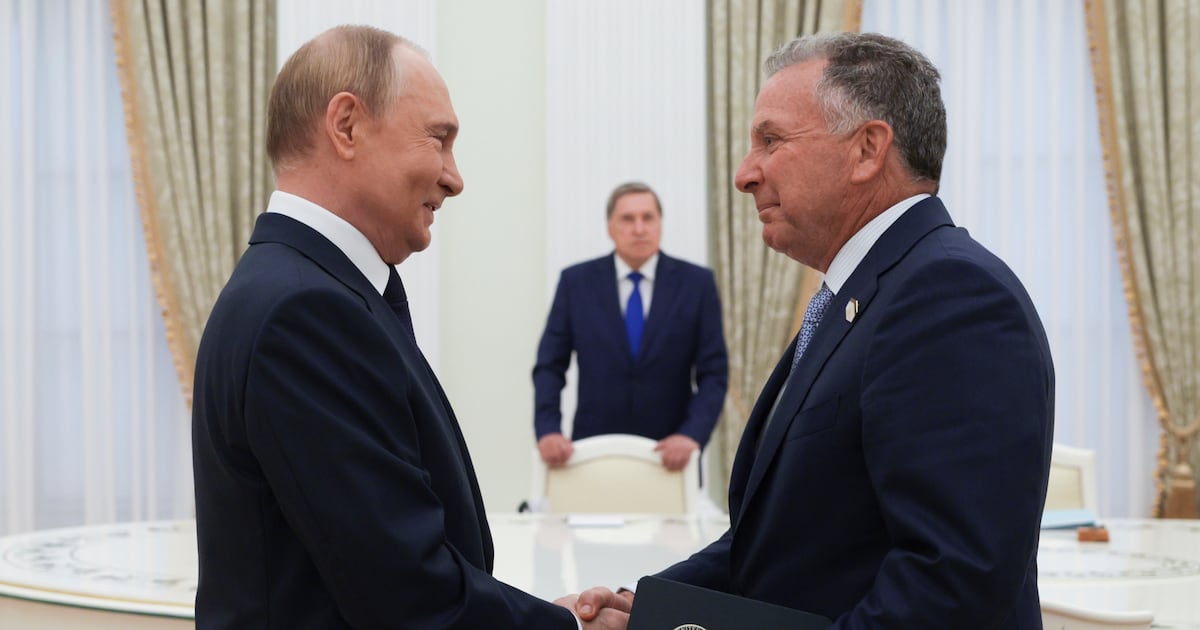US presidential envoy Steve Witkoff, fresh from the triumph of the Gaza peace deal, held a phone call last month with a senior Kremlin official to suggest they work together on a similar plan for Ukraine – and that Vladimir Putin should raise it with Donald Trump.
In an October 14th phone call that lasted a little over five minutes, Mr Witkoff advised Yuri Ushakov, Putin’s top foreign policy aide, on how the Russian leader should broach the issue with Trump.
His guidance included suggestions on setting up a Trump-Putin call before Volodymyr Zelenskiy’s White House visit later that week and using the Gaza agreement as a way in.
“We put a 20-point Trump plan together that was 20 points for peace and I’m thinking maybe we do the same thing with you,” Mr Witkoff told Mr Ushakov, according to a recording of the conversation reviewed and transcribed by Bloomberg.
Asked about Mr Witkoff’s approach, Mr Trump said he hadn’t reviewed the call but that he heard it was a “standard negotiation”.
“He’s got to sell this to Ukraine. He’s going to sell Ukraine to Russia. That’s what a dealmaker does,” Mr Trump told reporters Tuesday. “You got to say, look, they want this, you got to convince them of this. I would imagine he’s saying the same thing to Ukraine, because each party has to give and take.”
Kremlin spokesman Dmitry Peskov didn’t immediately respond to comment.
The conversation for the first time offers direct insight into Mr Witkoff’s recent tactics for negotiating with Russia and what appears to be the genesis of the 28-point peace proposal that emerged earlier this month – which the US has pushed Ukraine to accept as the basis of a deal.
Mr Putin said this month he believed the US plan could be used as the basis for a peace settlement. He told senior officials at a meeting of the Russian security council that the 28-point plan had not been discussed in detail yet with the US, but that Moscow had received a copy of it.
Mr Trump said Tuesday he was directing Mr Witkoff to meet Mr Putin, in the hopes of finalising a peace plan.
 US president Trump said on Tuesday he was directing Mr Witkoff to meet Mr Putin, in the hopes of finalising a peace plan. Photograph: Jim Watson/AFP/Getty Images
US president Trump said on Tuesday he was directing Mr Witkoff to meet Mr Putin, in the hopes of finalising a peace plan. Photograph: Jim Watson/AFP/Getty Images
“The original 28-Point Peace Plan, which was drafted by the United States, has been fine-tuned, with additional input from both sides, and there are only a few remaining points of disagreement,” the president said in a post on Truth Social.
At the time of the Witkoff-Ushakov call, Mr Trump was basking in the success of his drive to end the war in Gaza. The day before, he’d become the first US president to address the Israeli Knesset since 2008 after securing the release of the final 20 living hostages held by Hamas.
[ Sign up to Denis Staunton’s Global Briefing newsletterOpens in new window ]
Mr Trump’s attitude toward Mr Putin, however, appeared to be souring. As he prepared for his meeting with Mr Zelenskiy on October 17th, he was considering providing Ukraine with longer-range Tomahawk missiles, discussing fresh sanctions on Russia and voicing his frustration with Mr Putin.
“I don’t know why he continues with this war,” Mr Trump said on October 14th, the same day that Mr Witkoff spoke with Mr Ushakov. “He just doesn’t want to end that war. And I think it’s making him look very bad.”
During his call with Mr Ushakov, Mr Witkoff told his Russian counterpart that he had deep respect for Putin and that he had told Mr Trump that it was his belief that Russia has always wanted a peace deal. The US envoy mentioned Mr Zelenskiy’s upcoming visit and suggested that Mr Putin could speak to Mr Trump in advance of that meeting.
“Zelenskiy is coming to the White House on Friday,” Mr Witkoff said. “I will go to that because they want me there, but I think if possible we have the call with your boss before that Friday meeting.”
Mr Ushakov asked Mr Witkoff whether it would be “useful” for Mr Putin to call Mr Trump. Witkoff said it would.
He also recommended that Mr Putin congratulate Mr Trump for the Gaza peace deal, say that Russia had supported it and that he respects the president as a man of peace. “From that, it’s going to be a really good call,” Mr Witkoff said.
“Here’s what I think would be amazing,” Mr Witkoff then added. “Maybe he says to President Trump: you know, Steve and Yuri discussed a very similar 20-point plan to peace and that could be something that we think might move the needle a little bit, we’re open to those sorts of things.”
Mr Ushakov appeared to take some of the advice on board. Mr Putin “will congratulate” and will say “Mr Trump is a real peace man”, he said.
[ A new scramble for Africa as Europe, China and US compete for mineralsOpens in new window ]
Mr Trump and Mr Putin held their call two days later, at Russia’s request, and the US president described the 2½-hour conversation as “very productive.” Afterward, he announced plans to meet the Russian leader in Budapest, a summit that is yet to take place, and also mentioned that Mr Putin had congratulated him on the Gaza deal.
Following up on that call, Mr Witkoff met Kirill Dmitriev, another senior Kremlin adviser, in Miami, according to an interview that Mr Dmitriev gave to Axios. Mr Dmitriev told Axios he spent three days in Miami from October 24th. A spokesperson for Mr Dmitriev declined to comment.
On October 29th, Mr Dmitriev and Mr Ushakov spoke by phone in Russian and debated how strongly Moscow should push for its demands in any peace proposal, according to another recording reviewed by Bloomberg.
As the two Putin aides considered various options, Mr Ushakov argued for asking for “the maximum” in their submissions to the White House.
He said he was concerned the US might misinterpret any proposals and might take something out but then claim there was an agreement, and that would risk the end of the negotiations, he told his colleague.
Mr Dmitriev, who also heads the Russian Direct Investment Fund, suggested sharing a paper informally and said he was confident that even if the US didn’t completely take Russia’s version they would at least do something very close to it.
He later assured Mr Ushakov that he would stick to what he was told to say, and that Mr Ushakov could also discuss the paper later with “Steve”.
Bloomberg reported that it has been unable to confirm exactly what proposals Russia shared with the US and the extent to which they shaped the final 28-point blueprint.
Since then, however, Ukraine has come under severe pressure to accept the proposal that Mr Witkoff drafted with the help of his Kremlin counterparts. US officials had threatened to shut off critical intelligence support to the Ukrainian military if Mr Zelenskiy refused to accept the proposal, although Kyiv has since won some concessions and persuaded the US to slow down following talks with US secretary of state Marco Rubio on Sunday.
Under the terms first proposed by the US earlier this month, Ukraine would have to withdraw troops from parts of the eastern Donbas region that Russia has failed to capture through military force. The area would become a neutral demilitarised buffer zone internationally recognised as Russian.
Moscow would also obtain de facto recognition of Russian claims to the regions of Crimea, Luhansk and Donetsk. Most of the remainder of the front line, including in Kherson and Zaporizhzhia, would be effectively frozen. Ukraine and its European allies have insisted that the war should cease along current lines.
Those are some of the conditions that Mr Witkoff and Mr Ushakov appear to preview during their call last month.
“Me to you, I know what it’s going to take to get a peace deal done,” Mr Witkoff said. “Donetsk and maybe a land swap somewhere. But I’m saying instead of talking like that, let’s talk more hopefully because I think we’re going to get to a deal here.”
“The president will give me a lot of space and discretion to get to the deal,” he added. “So if we can create that opportunity that after this I talked to Yuri and we had a conversation I think that could lead to big stuff.”
“Okay,” Mr Ushakov replied. “That sounds good.” – Bloomberg

